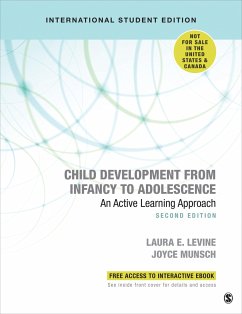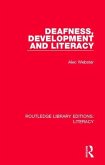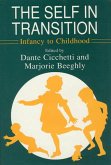Joyce Munsch, Laura E. E. Levine
Child Development From Infancy to Adolescence - International Student Edition
An Active Learning Approach
Joyce Munsch, Laura E. E. Levine
Child Development From Infancy to Adolescence - International Student Edition
An Active Learning Approach
- Broschiertes Buch
- Merkliste
- Auf die Merkliste
- Bewerten Bewerten
- Teilen
- Produkt teilen
- Produkterinnerung
- Produkterinnerung
Chronologically organized,this book presents topics within the field of child development through unique and highly engaging active learning opportunities.
Andere Kunden interessierten sich auch für
![Infancy Infancy]() Marc H BornsteinInfancy194,99 €
Marc H BornsteinInfancy194,99 €![The Child as Social Person The Child as Social Person]() Sara MeadowsThe Child as Social Person202,99 €
Sara MeadowsThe Child as Social Person202,99 €![International Research Handbook on Values Education and Student Wellbeing International Research Handbook on Values Education and Student Wellbeing]() International Research Handbook on Values Education and Student Wellbeing221,99 €
International Research Handbook on Values Education and Student Wellbeing221,99 €![Deafness, Development and Literacy Deafness, Development and Literacy]() Alec WebsterDeafness, Development and Literacy180,99 €
Alec WebsterDeafness, Development and Literacy180,99 €![The Self in Transition: Infancy to Childhood The Self in Transition: Infancy to Childhood]() The Self in Transition: Infancy to Childhood93,99 €
The Self in Transition: Infancy to Childhood93,99 €![The Strategic Guide to Shaping Your Student Affairs Career The Strategic Guide to Shaping Your Student Affairs Career]() Sonja ArdoinThe Strategic Guide to Shaping Your Student Affairs Career202,99 €
Sonja ArdoinThe Strategic Guide to Shaping Your Student Affairs Career202,99 €![Psychological competence of the educator in developing students' creativity Psychological competence of the educator in developing students' creativity]() Nina MalukhinaPsychological competence of the educator in developing students' creativity44,99 €
Nina MalukhinaPsychological competence of the educator in developing students' creativity44,99 €-
-
-
Chronologically organized,this book presents topics within the field of child development through unique and highly engaging active learning opportunities.
Hinweis: Dieser Artikel kann nur an eine deutsche Lieferadresse ausgeliefert werden.
Hinweis: Dieser Artikel kann nur an eine deutsche Lieferadresse ausgeliefert werden.
Produktdetails
- Produktdetails
- Verlag: SAGE Publications Inc
- Seitenzahl: 744
- Erscheinungstermin: 11. März 2019
- Englisch
- Abmessung: 221mm x 278mm x 25mm
- Gewicht: 1574g
- ISBN-13: 9781544371962
- ISBN-10: 1544371969
- Artikelnr.: 55717522
- Herstellerkennzeichnung
- Libri GmbH
- Europaallee 1
- 36244 Bad Hersfeld
- 06621 890
- Verlag: SAGE Publications Inc
- Seitenzahl: 744
- Erscheinungstermin: 11. März 2019
- Englisch
- Abmessung: 221mm x 278mm x 25mm
- Gewicht: 1574g
- ISBN-13: 9781544371962
- ISBN-10: 1544371969
- Artikelnr.: 55717522
- Herstellerkennzeichnung
- Libri GmbH
- Europaallee 1
- 36244 Bad Hersfeld
- 06621 890
Laura E. Levine received her PhD in developmental and clinical psychology from the University of Michigan. After working with children and families at the Children's Psychiatric Hospital and in private practice in Ann Arbor for 10 years, she moved to Connecticut and was a stay-at-home mother of her two children for 6 years. She returned to academia in 1994 and taught child psychology and life span development for 20 years at Central Connecticut State University, where she is currently a professor emerita of the Department of Psychological Science. She has received three university teaching awards, and her research on the social development of young children and on the relation between media use and attention difficulties has appeared in journals such as Developmental Psychology, the Journal of Applied Developmental Psychology, Infant Mental Health Journal, Infant and Child Development, Computers and Education, and CyberPsychology, Behavior, and Social Networking. Dr. Levine has been very active in promoting excellence in college teaching. She was involved in the creation of the Center for Teaching Excellence at Central Connecticut State University and served on the board of the Connecticut Consortium to Enhance Learning and Teaching. She created numerous programs for faculty both at her university and at regional and national conferences. Her work on the scholarship of teaching and learning can be found in New Directions for Teaching and Learning, College Teaching and the International Journal for the Scholarship of Teaching and Learning .
List of Active Learning
List of Journey of Research
Preface
About the Authors
PART I: UNDERSTANDING DEVELOPMENT: WHY AND HOW WE STUDY CHILDREN AND
ADOLESCENTS
CHAPTER 1. ISSUES AND THEMES IN CHILD DEVELOPMENT
Why Study Childhood?
Understanding How Development Happens
Contexts of Development
Being a Smart Consumer of Information About Development
Conclusion
Chapter Summary
Key Terms
CHAPTER 2. THEORY AND RESEARCH IN DEVELOPMENT
Why Theories of Development are Important
Theories of Child and Adolescent Development
Psychoanalytic Theory
Learning Theories
Theories of Cognitive Development
Evolutionary Theory: Ethology
Ecological Theory
Dynamic Systems Theory
The Impact of Biology and Culture on Child Development Theory and Research
Comparison of Developmental Theories
Research Methods
Ethics in Research With Children and Adolescents
Conclusion
Chapter Summary
Key Terms
PART II : FOUNDATIONS OF CHILD DEVELOPMENT
CHAPTER 3. NATURE THROUGH NURTURE: GENES AND ENVIRONMENT
The Study of Genes and Behavior
Molecular Genetics: Chromosomes, Genes, and DNA
Genetic Disorders
Behavioral Genetics
The Interaction of Genes and Environment
Conclusion
Chapter Summary
Key Terms
CHAPTER 4. PRENATAL DEVELOPMENT, THE NEWBORN, AND THE TRANSITION TO
PARENTHOOD
The Three Stages of Prenatal Development
Health and Risks in Pregnancy
The Birth Experience
The Newborn
The Transition to Parenthood
Conclusion
Chapter Summary
Key Terms
PART III : INFANCY AND TODDLERHOOD
CHAPTER 5. PHYSICAL DEVELOPMENT IN INFANCY AND TODDLERHOOD
Brain Development
Sensation and Perception
Infant Body Growth and Motor Development
Health and Nutrition
Conclusion
Chapter Summary
Key Terms
CHAPTER 6. COGNITIVE DEVELOPMENT IN INFANCY AND TODDLERHOOD
Piaget's Theory of Cognitive Development
Theory of Core Knowledge
Learning
Cognitive Processes
Individual Differences in Cognitive Abilities
Language Development
Threats to and Support for Cognitive and Language Development
Conclusion
Chapter Summary
Key Terms
CHAPTER 7. SOCIAL AND EMOTIONAL DEVELOPMENT IN INFANCY AND TODDLERHOOD
Emotions and Temperament: Universality and Difference
The Self in Infants and Toddlers
Attachment
Contexts of Development
Conclusion
Chapter Summary
Key Terms
PART IV: EARLY CHILDHOOD
CHAPTER 8. PHYSICAL DEVELOPMENT IN EARLY CHILDHOOD
Body Growth and Changes
Body Awareness, Body Image, and Sexuality
Brain Development
Health and Nutrition
Illnesses and Threats to Health
Child Maltreatment
Conclusion
Chapter Summary
Key Terms
CHAPTER 9. COGNITIVE DEVELOPMENT IN EARLY CHILDHOOD
Piaget's Theory of Cognitive Development: The Preoperational Stage (2-7
Years)
Vygotsky's Sociocultural Theory of Cognitive Development
Cognitive Processes
Play and Cognitive Development
Language Development in Early Childhood
Preacademic Skills: Reading, Writing, and Arithmetic
Risk Factors and Supports for Cognitive and Language Development in Early
Childhood
Conclusion
Chapter Summary
Key Terms
CHAPTER 10. SOCIAL AND EMOTIONAL DEVELOPMENT IN EARLY CHILDHOOD
Emotional Development
Self-Concept, Self-Esteem, and Self-Control
Development of Gender Identity
Moral Development
Family Relationships
Peer Relationships and the Role of Play
Risks, Resources, and Resilience
Conclusion
Chapter Summary
Key Terms
PART V: MIDDLE CHILDHOOD
CHAPTER 11. PHYSICAL DEVELOPMENT IN MIDDLE CHILDHOOD
Body Growth and Changes
Brain Development
Health and Well-Being
Physical Activity
Children and the Natural World
Conclusion
Chapter Summary
Key Terms
CHAPTER 12. COGNITIVE DEVELOPMENT IN MIDDLE CHILDHOOD
Piaget's Stage of Concrete Operations (7-12 Years)
Cognitive Processes
Language Development
Intelligence
Cognitive Deficits and Intellectual Gifts
Academic Achievement
Conclusion
Chapter Summary
Key Terms
CHAPTER 13. SOCIAL AND EMOTIONAL DEVELOPMENT IN MIDDLE CHILDHOOD
The Self and Identity in School-Age Children
Emotional Development and Emotional Problems
Family Relationships
Diversity in Family Life
Peer Relationships
Stress, Coping, and Resilience
Conclusion
Chapter Summary
Key Terms
PART VI: ADOLESCENCE
CHAPTER 14. PHYSICAL DEVELOPMENT IN ADOLESCENCE
Brain Development
Body Growth and Changes
Teens and Sexuality
Health and Nutrition
Stress and Coping
Conclusion
Chapter Summary
Key Terms
CHAPTER 15. COGNITIVE DEVELOPMENT IN ADOLESCENCE
Piaget's Stage of Formal Operations (12 Years and Older)
Cognitive Processes
Moral Judgment
The Language of Teenagers
Adolescent Cognitive Development in Context
Risk and Success in Secondary Education
Conclusion
Chapter Summary
Key Terms
CHAPTER 16. SOCIAL AND EMOTIONAL DEVELOPMENT IN ADOLESCENCE
The Self in Adolescence
Emotions
Family Relationships
Peer Relationships
Beyond Parents and Peers: Important Nonparental Adults
The Daily Lives of Adolescents
Emerging Adulthood
Conclusion
Chapter Summary
Key Terms
Glossary
References
Name Index
Subject Index
List of Journey of Research
Preface
About the Authors
PART I: UNDERSTANDING DEVELOPMENT: WHY AND HOW WE STUDY CHILDREN AND
ADOLESCENTS
CHAPTER 1. ISSUES AND THEMES IN CHILD DEVELOPMENT
Why Study Childhood?
Understanding How Development Happens
Contexts of Development
Being a Smart Consumer of Information About Development
Conclusion
Chapter Summary
Key Terms
CHAPTER 2. THEORY AND RESEARCH IN DEVELOPMENT
Why Theories of Development are Important
Theories of Child and Adolescent Development
Psychoanalytic Theory
Learning Theories
Theories of Cognitive Development
Evolutionary Theory: Ethology
Ecological Theory
Dynamic Systems Theory
The Impact of Biology and Culture on Child Development Theory and Research
Comparison of Developmental Theories
Research Methods
Ethics in Research With Children and Adolescents
Conclusion
Chapter Summary
Key Terms
PART II : FOUNDATIONS OF CHILD DEVELOPMENT
CHAPTER 3. NATURE THROUGH NURTURE: GENES AND ENVIRONMENT
The Study of Genes and Behavior
Molecular Genetics: Chromosomes, Genes, and DNA
Genetic Disorders
Behavioral Genetics
The Interaction of Genes and Environment
Conclusion
Chapter Summary
Key Terms
CHAPTER 4. PRENATAL DEVELOPMENT, THE NEWBORN, AND THE TRANSITION TO
PARENTHOOD
The Three Stages of Prenatal Development
Health and Risks in Pregnancy
The Birth Experience
The Newborn
The Transition to Parenthood
Conclusion
Chapter Summary
Key Terms
PART III : INFANCY AND TODDLERHOOD
CHAPTER 5. PHYSICAL DEVELOPMENT IN INFANCY AND TODDLERHOOD
Brain Development
Sensation and Perception
Infant Body Growth and Motor Development
Health and Nutrition
Conclusion
Chapter Summary
Key Terms
CHAPTER 6. COGNITIVE DEVELOPMENT IN INFANCY AND TODDLERHOOD
Piaget's Theory of Cognitive Development
Theory of Core Knowledge
Learning
Cognitive Processes
Individual Differences in Cognitive Abilities
Language Development
Threats to and Support for Cognitive and Language Development
Conclusion
Chapter Summary
Key Terms
CHAPTER 7. SOCIAL AND EMOTIONAL DEVELOPMENT IN INFANCY AND TODDLERHOOD
Emotions and Temperament: Universality and Difference
The Self in Infants and Toddlers
Attachment
Contexts of Development
Conclusion
Chapter Summary
Key Terms
PART IV: EARLY CHILDHOOD
CHAPTER 8. PHYSICAL DEVELOPMENT IN EARLY CHILDHOOD
Body Growth and Changes
Body Awareness, Body Image, and Sexuality
Brain Development
Health and Nutrition
Illnesses and Threats to Health
Child Maltreatment
Conclusion
Chapter Summary
Key Terms
CHAPTER 9. COGNITIVE DEVELOPMENT IN EARLY CHILDHOOD
Piaget's Theory of Cognitive Development: The Preoperational Stage (2-7
Years)
Vygotsky's Sociocultural Theory of Cognitive Development
Cognitive Processes
Play and Cognitive Development
Language Development in Early Childhood
Preacademic Skills: Reading, Writing, and Arithmetic
Risk Factors and Supports for Cognitive and Language Development in Early
Childhood
Conclusion
Chapter Summary
Key Terms
CHAPTER 10. SOCIAL AND EMOTIONAL DEVELOPMENT IN EARLY CHILDHOOD
Emotional Development
Self-Concept, Self-Esteem, and Self-Control
Development of Gender Identity
Moral Development
Family Relationships
Peer Relationships and the Role of Play
Risks, Resources, and Resilience
Conclusion
Chapter Summary
Key Terms
PART V: MIDDLE CHILDHOOD
CHAPTER 11. PHYSICAL DEVELOPMENT IN MIDDLE CHILDHOOD
Body Growth and Changes
Brain Development
Health and Well-Being
Physical Activity
Children and the Natural World
Conclusion
Chapter Summary
Key Terms
CHAPTER 12. COGNITIVE DEVELOPMENT IN MIDDLE CHILDHOOD
Piaget's Stage of Concrete Operations (7-12 Years)
Cognitive Processes
Language Development
Intelligence
Cognitive Deficits and Intellectual Gifts
Academic Achievement
Conclusion
Chapter Summary
Key Terms
CHAPTER 13. SOCIAL AND EMOTIONAL DEVELOPMENT IN MIDDLE CHILDHOOD
The Self and Identity in School-Age Children
Emotional Development and Emotional Problems
Family Relationships
Diversity in Family Life
Peer Relationships
Stress, Coping, and Resilience
Conclusion
Chapter Summary
Key Terms
PART VI: ADOLESCENCE
CHAPTER 14. PHYSICAL DEVELOPMENT IN ADOLESCENCE
Brain Development
Body Growth and Changes
Teens and Sexuality
Health and Nutrition
Stress and Coping
Conclusion
Chapter Summary
Key Terms
CHAPTER 15. COGNITIVE DEVELOPMENT IN ADOLESCENCE
Piaget's Stage of Formal Operations (12 Years and Older)
Cognitive Processes
Moral Judgment
The Language of Teenagers
Adolescent Cognitive Development in Context
Risk and Success in Secondary Education
Conclusion
Chapter Summary
Key Terms
CHAPTER 16. SOCIAL AND EMOTIONAL DEVELOPMENT IN ADOLESCENCE
The Self in Adolescence
Emotions
Family Relationships
Peer Relationships
Beyond Parents and Peers: Important Nonparental Adults
The Daily Lives of Adolescents
Emerging Adulthood
Conclusion
Chapter Summary
Key Terms
Glossary
References
Name Index
Subject Index
List of Active Learning
List of Journey of Research
Preface
About the Authors
PART I: UNDERSTANDING DEVELOPMENT: WHY AND HOW WE STUDY CHILDREN AND
ADOLESCENTS
CHAPTER 1. ISSUES AND THEMES IN CHILD DEVELOPMENT
Why Study Childhood?
Understanding How Development Happens
Contexts of Development
Being a Smart Consumer of Information About Development
Conclusion
Chapter Summary
Key Terms
CHAPTER 2. THEORY AND RESEARCH IN DEVELOPMENT
Why Theories of Development are Important
Theories of Child and Adolescent Development
Psychoanalytic Theory
Learning Theories
Theories of Cognitive Development
Evolutionary Theory: Ethology
Ecological Theory
Dynamic Systems Theory
The Impact of Biology and Culture on Child Development Theory and Research
Comparison of Developmental Theories
Research Methods
Ethics in Research With Children and Adolescents
Conclusion
Chapter Summary
Key Terms
PART II : FOUNDATIONS OF CHILD DEVELOPMENT
CHAPTER 3. NATURE THROUGH NURTURE: GENES AND ENVIRONMENT
The Study of Genes and Behavior
Molecular Genetics: Chromosomes, Genes, and DNA
Genetic Disorders
Behavioral Genetics
The Interaction of Genes and Environment
Conclusion
Chapter Summary
Key Terms
CHAPTER 4. PRENATAL DEVELOPMENT, THE NEWBORN, AND THE TRANSITION TO
PARENTHOOD
The Three Stages of Prenatal Development
Health and Risks in Pregnancy
The Birth Experience
The Newborn
The Transition to Parenthood
Conclusion
Chapter Summary
Key Terms
PART III : INFANCY AND TODDLERHOOD
CHAPTER 5. PHYSICAL DEVELOPMENT IN INFANCY AND TODDLERHOOD
Brain Development
Sensation and Perception
Infant Body Growth and Motor Development
Health and Nutrition
Conclusion
Chapter Summary
Key Terms
CHAPTER 6. COGNITIVE DEVELOPMENT IN INFANCY AND TODDLERHOOD
Piaget's Theory of Cognitive Development
Theory of Core Knowledge
Learning
Cognitive Processes
Individual Differences in Cognitive Abilities
Language Development
Threats to and Support for Cognitive and Language Development
Conclusion
Chapter Summary
Key Terms
CHAPTER 7. SOCIAL AND EMOTIONAL DEVELOPMENT IN INFANCY AND TODDLERHOOD
Emotions and Temperament: Universality and Difference
The Self in Infants and Toddlers
Attachment
Contexts of Development
Conclusion
Chapter Summary
Key Terms
PART IV: EARLY CHILDHOOD
CHAPTER 8. PHYSICAL DEVELOPMENT IN EARLY CHILDHOOD
Body Growth and Changes
Body Awareness, Body Image, and Sexuality
Brain Development
Health and Nutrition
Illnesses and Threats to Health
Child Maltreatment
Conclusion
Chapter Summary
Key Terms
CHAPTER 9. COGNITIVE DEVELOPMENT IN EARLY CHILDHOOD
Piaget's Theory of Cognitive Development: The Preoperational Stage (2-7
Years)
Vygotsky's Sociocultural Theory of Cognitive Development
Cognitive Processes
Play and Cognitive Development
Language Development in Early Childhood
Preacademic Skills: Reading, Writing, and Arithmetic
Risk Factors and Supports for Cognitive and Language Development in Early
Childhood
Conclusion
Chapter Summary
Key Terms
CHAPTER 10. SOCIAL AND EMOTIONAL DEVELOPMENT IN EARLY CHILDHOOD
Emotional Development
Self-Concept, Self-Esteem, and Self-Control
Development of Gender Identity
Moral Development
Family Relationships
Peer Relationships and the Role of Play
Risks, Resources, and Resilience
Conclusion
Chapter Summary
Key Terms
PART V: MIDDLE CHILDHOOD
CHAPTER 11. PHYSICAL DEVELOPMENT IN MIDDLE CHILDHOOD
Body Growth and Changes
Brain Development
Health and Well-Being
Physical Activity
Children and the Natural World
Conclusion
Chapter Summary
Key Terms
CHAPTER 12. COGNITIVE DEVELOPMENT IN MIDDLE CHILDHOOD
Piaget's Stage of Concrete Operations (7-12 Years)
Cognitive Processes
Language Development
Intelligence
Cognitive Deficits and Intellectual Gifts
Academic Achievement
Conclusion
Chapter Summary
Key Terms
CHAPTER 13. SOCIAL AND EMOTIONAL DEVELOPMENT IN MIDDLE CHILDHOOD
The Self and Identity in School-Age Children
Emotional Development and Emotional Problems
Family Relationships
Diversity in Family Life
Peer Relationships
Stress, Coping, and Resilience
Conclusion
Chapter Summary
Key Terms
PART VI: ADOLESCENCE
CHAPTER 14. PHYSICAL DEVELOPMENT IN ADOLESCENCE
Brain Development
Body Growth and Changes
Teens and Sexuality
Health and Nutrition
Stress and Coping
Conclusion
Chapter Summary
Key Terms
CHAPTER 15. COGNITIVE DEVELOPMENT IN ADOLESCENCE
Piaget's Stage of Formal Operations (12 Years and Older)
Cognitive Processes
Moral Judgment
The Language of Teenagers
Adolescent Cognitive Development in Context
Risk and Success in Secondary Education
Conclusion
Chapter Summary
Key Terms
CHAPTER 16. SOCIAL AND EMOTIONAL DEVELOPMENT IN ADOLESCENCE
The Self in Adolescence
Emotions
Family Relationships
Peer Relationships
Beyond Parents and Peers: Important Nonparental Adults
The Daily Lives of Adolescents
Emerging Adulthood
Conclusion
Chapter Summary
Key Terms
Glossary
References
Name Index
Subject Index
List of Journey of Research
Preface
About the Authors
PART I: UNDERSTANDING DEVELOPMENT: WHY AND HOW WE STUDY CHILDREN AND
ADOLESCENTS
CHAPTER 1. ISSUES AND THEMES IN CHILD DEVELOPMENT
Why Study Childhood?
Understanding How Development Happens
Contexts of Development
Being a Smart Consumer of Information About Development
Conclusion
Chapter Summary
Key Terms
CHAPTER 2. THEORY AND RESEARCH IN DEVELOPMENT
Why Theories of Development are Important
Theories of Child and Adolescent Development
Psychoanalytic Theory
Learning Theories
Theories of Cognitive Development
Evolutionary Theory: Ethology
Ecological Theory
Dynamic Systems Theory
The Impact of Biology and Culture on Child Development Theory and Research
Comparison of Developmental Theories
Research Methods
Ethics in Research With Children and Adolescents
Conclusion
Chapter Summary
Key Terms
PART II : FOUNDATIONS OF CHILD DEVELOPMENT
CHAPTER 3. NATURE THROUGH NURTURE: GENES AND ENVIRONMENT
The Study of Genes and Behavior
Molecular Genetics: Chromosomes, Genes, and DNA
Genetic Disorders
Behavioral Genetics
The Interaction of Genes and Environment
Conclusion
Chapter Summary
Key Terms
CHAPTER 4. PRENATAL DEVELOPMENT, THE NEWBORN, AND THE TRANSITION TO
PARENTHOOD
The Three Stages of Prenatal Development
Health and Risks in Pregnancy
The Birth Experience
The Newborn
The Transition to Parenthood
Conclusion
Chapter Summary
Key Terms
PART III : INFANCY AND TODDLERHOOD
CHAPTER 5. PHYSICAL DEVELOPMENT IN INFANCY AND TODDLERHOOD
Brain Development
Sensation and Perception
Infant Body Growth and Motor Development
Health and Nutrition
Conclusion
Chapter Summary
Key Terms
CHAPTER 6. COGNITIVE DEVELOPMENT IN INFANCY AND TODDLERHOOD
Piaget's Theory of Cognitive Development
Theory of Core Knowledge
Learning
Cognitive Processes
Individual Differences in Cognitive Abilities
Language Development
Threats to and Support for Cognitive and Language Development
Conclusion
Chapter Summary
Key Terms
CHAPTER 7. SOCIAL AND EMOTIONAL DEVELOPMENT IN INFANCY AND TODDLERHOOD
Emotions and Temperament: Universality and Difference
The Self in Infants and Toddlers
Attachment
Contexts of Development
Conclusion
Chapter Summary
Key Terms
PART IV: EARLY CHILDHOOD
CHAPTER 8. PHYSICAL DEVELOPMENT IN EARLY CHILDHOOD
Body Growth and Changes
Body Awareness, Body Image, and Sexuality
Brain Development
Health and Nutrition
Illnesses and Threats to Health
Child Maltreatment
Conclusion
Chapter Summary
Key Terms
CHAPTER 9. COGNITIVE DEVELOPMENT IN EARLY CHILDHOOD
Piaget's Theory of Cognitive Development: The Preoperational Stage (2-7
Years)
Vygotsky's Sociocultural Theory of Cognitive Development
Cognitive Processes
Play and Cognitive Development
Language Development in Early Childhood
Preacademic Skills: Reading, Writing, and Arithmetic
Risk Factors and Supports for Cognitive and Language Development in Early
Childhood
Conclusion
Chapter Summary
Key Terms
CHAPTER 10. SOCIAL AND EMOTIONAL DEVELOPMENT IN EARLY CHILDHOOD
Emotional Development
Self-Concept, Self-Esteem, and Self-Control
Development of Gender Identity
Moral Development
Family Relationships
Peer Relationships and the Role of Play
Risks, Resources, and Resilience
Conclusion
Chapter Summary
Key Terms
PART V: MIDDLE CHILDHOOD
CHAPTER 11. PHYSICAL DEVELOPMENT IN MIDDLE CHILDHOOD
Body Growth and Changes
Brain Development
Health and Well-Being
Physical Activity
Children and the Natural World
Conclusion
Chapter Summary
Key Terms
CHAPTER 12. COGNITIVE DEVELOPMENT IN MIDDLE CHILDHOOD
Piaget's Stage of Concrete Operations (7-12 Years)
Cognitive Processes
Language Development
Intelligence
Cognitive Deficits and Intellectual Gifts
Academic Achievement
Conclusion
Chapter Summary
Key Terms
CHAPTER 13. SOCIAL AND EMOTIONAL DEVELOPMENT IN MIDDLE CHILDHOOD
The Self and Identity in School-Age Children
Emotional Development and Emotional Problems
Family Relationships
Diversity in Family Life
Peer Relationships
Stress, Coping, and Resilience
Conclusion
Chapter Summary
Key Terms
PART VI: ADOLESCENCE
CHAPTER 14. PHYSICAL DEVELOPMENT IN ADOLESCENCE
Brain Development
Body Growth and Changes
Teens and Sexuality
Health and Nutrition
Stress and Coping
Conclusion
Chapter Summary
Key Terms
CHAPTER 15. COGNITIVE DEVELOPMENT IN ADOLESCENCE
Piaget's Stage of Formal Operations (12 Years and Older)
Cognitive Processes
Moral Judgment
The Language of Teenagers
Adolescent Cognitive Development in Context
Risk and Success in Secondary Education
Conclusion
Chapter Summary
Key Terms
CHAPTER 16. SOCIAL AND EMOTIONAL DEVELOPMENT IN ADOLESCENCE
The Self in Adolescence
Emotions
Family Relationships
Peer Relationships
Beyond Parents and Peers: Important Nonparental Adults
The Daily Lives of Adolescents
Emerging Adulthood
Conclusion
Chapter Summary
Key Terms
Glossary
References
Name Index
Subject Index








